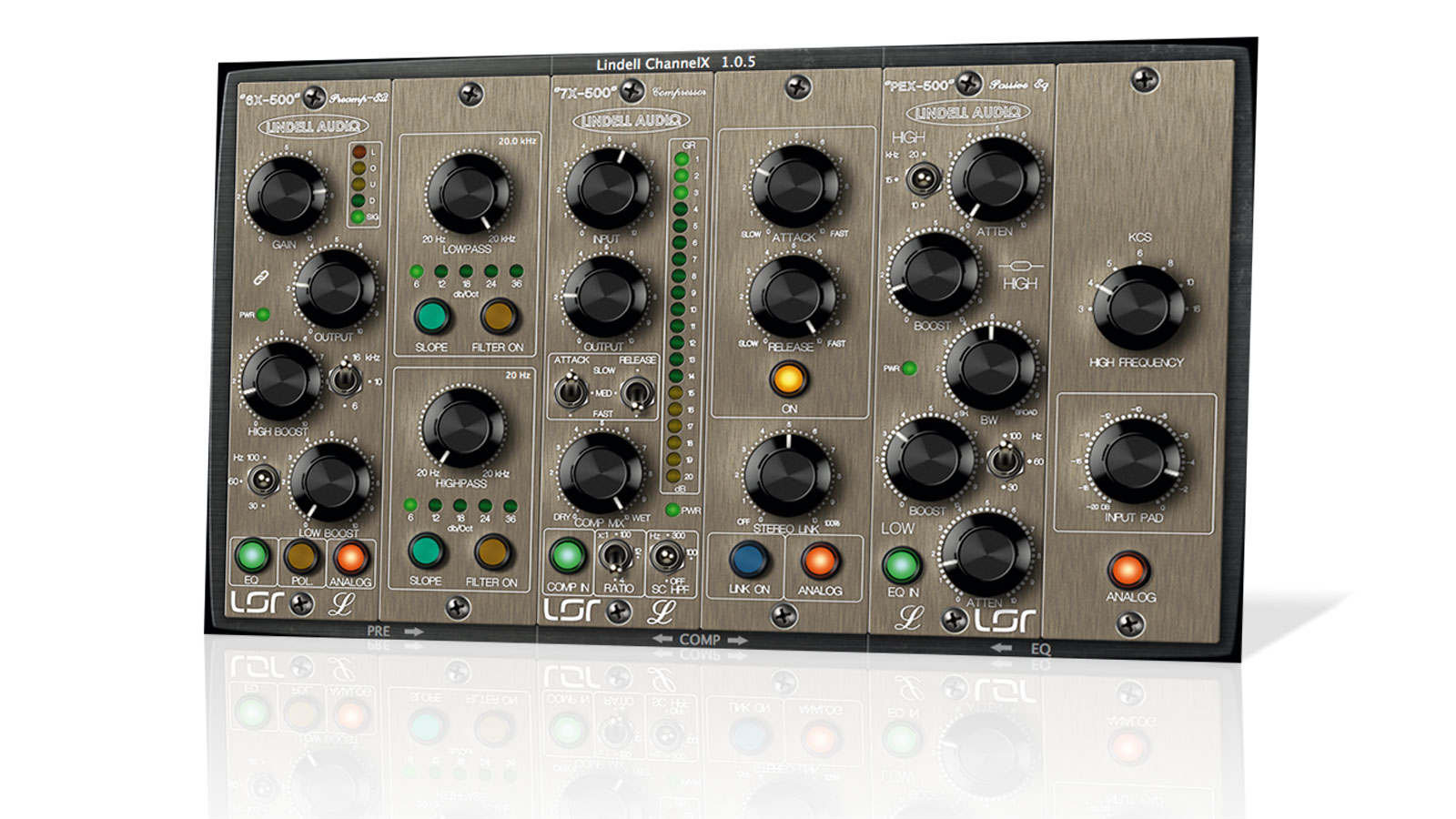MusicRadar Verdict
A refreshing alternative to the usual lookalike emulations, Lindell's plugin debut packs in lush, analogue vibes aplenty.
Pros
- +
Good all-round channel strip. Natural-sounding passive EQ. Analogue colouration. Drive saturation of preamp.
Cons
- -
A model too far? No midrange EQ. Very 'non-surgical' EQ.
MusicRadar's got your back
Boutique manufacturer Lindell Audio make 500-series 'lunchbox' hardware modules, of which the Channel X package comprises three: a mic preamp, a passive EQ and a compressor, all mounted in a proprietary powered rack.
With said EQ and compressor being, er, 'inspired' by the Pultec EQP-1A and Urei 1176, their new ChannelX plugin finds itself in the strange position of being a software emulation of a hardware 'emulation'.
"Usefully, the Gain and Output controls can be inversely linked to maintain unity gain"
The ChannelX bundle (VST/AU/RTAS/AAX) comprises the 6X-500 preamp and filter plugin, the 7X-500 FET compressor plugin and the PEX- 500 passive EQ plugin, plus a fourth plugin - ChannelX - that combines all three in one 'rack' with an adjustable signal chain.
The 6X-500 preamp (the parent hardware of which is an original Lindell design) has transformer-balanced input and output controls, called Gain and Output, with a set of simple passive tone controls and filters in between.
Usefully, the Gain and Output controls can be inversely linked to maintain unity gain - turn Gain up and Output reduces proportionately - while the Analog button enables progressive saturation of the preamp circuitry and the introduction of low-level analogue noise and hum.
The preamp tone controls take the form of passive High and Low Boost knobs, each coupled with a choice of three roll-off frequencies. The Highpass and Lowpass filters both range from 20Hz to 20kHz and have five selectable slopes: 6, 12, 18, 24 and 36dB/oct.
The PEX-500 passive EQ is a double module that apes the classic Pultec EQP-1A, but with the modern addition of a Mid/Side mode. It features a high boost bell band with seven centre frequencies (3, 4, 5, 6, 8, 10 and 16kHz) and a bandwidth control, plus a high Attenuation shelf with 10, 15 and 20kHz options.
Want all the hottest music and gear news, reviews, deals, features and more, direct to your inbox? Sign up here.
At the bottom end, the Low Boost and Low Attenuation knobs can be used together to apply the classic Pultec 'upper low frequency' scoop to basses and kick drums at 30, 60 or 100Hz.
X hits the spot
The simplicity and retro nature of ChannelX and its components makes for a generally pleasing experience, while the Analog mode works well to add colour to the sound, particularly in the preamp.
You can really push the preamp's gain without the sound becoming harsh, unpleasant or unnatural, making it a highly useful tool for everything from gentle warming to all-out overdrive.
The EQ and compressor, meanwhile, have an immediate, warm and full quality to their sound, and the biting nature of FET compression is captured well.
Whether you've had experience of Lindell's hardware or not, you'll be familiar with the workings of this channel strip because of its similarity to the industry standard Pultec PEQ-1 and Urei 1176 that it borrows from.
In addition, there's a smattering of added modern features such as the mid/side EQ option. All in all, it's a fine-sounding and keenly priced device, but without any surgical EQ onboard, you'll still be needing additional ammunition on your inserts in most circumstances, as it's not a one-stop channel strip shop.
Computer Music magazine is the world’s best selling publication dedicated solely to making great music with your Mac or PC computer. Each issue it brings its lucky readers the best in cutting-edge tutorials, need-to-know, expert software reviews and even all the tools you actually need to make great music today, courtesy of our legendary CM Plugin Suite.

